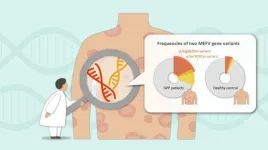(Press-News.org) University of Otago researchers have discovered three psychological factors that predict if a non-smoker will start vaping.
The study, published in the journal Drug and Alcohol Review, investigates how psychological traits related to personality and mental health predict the likelihood of vaping uptake over time in non-smoking adults.
Researchers, led by Professor Tamlin Conner of the Department of Psychology and Andre Mason of the Department of Psychological Medicine, analysed longitudinal data of more than 36,000 New Zealand adults from the New Zealand Attitudes and Values Study (NZAVS).
They found people who reported greater mental distress, lower self-control, and more social tendencies (higher “extraversion”) were more likely to take up vaping as non-smoking adults, compared to people with better mental health, higher self-control, and less social tendencies.
Professor Conner says the results show that “psychological factors matter in shaping health behaviours, including vaping”, which could have implications for interventions.
“Interventions to prevent vaping uptake among non-smoking adults could be more effective if they address mental health, self-control, or social factors,” she says. “For example, one could tailor interventions to appeal to at-risk individuals, providing them with additional support to prevent vaping initiation.
“Similarly, interventions and funding to improve mental health could have flow-on benefits to reducing vaping.”
Professor Conner says the reasons people start vaping are complex and vary greatly.
People experiencing mental distress may turn to substances to ease their pain, those with low self-control find it harder to resist temptation, and extraverted people are more likely to be in social settings where vaping is more common or use it to connect socially.
“New Zealanders are taking up vaping without having been smokers, which may expose them to unnecessary risks,” she says.
“This may be particularly true for psychologically vulnerable or highly social people.”
Surprisingly, these psychological factors predicted vaping uptake more than many sociodemographic factors.
People who initially did not smoke or vape were over 40 per cent more likely to start vaping if they experienced greater mental distress, compared with a 7 per cent increase due to economic deprivation.
Lower self-control and higher extraversion were linked with 21 and 9 per cent increases, respectively.
“This was unexpected because sociodemographic characteristics are usually very strong drivers of substance use.”
Professor Conner hopes the findings make people aware of how their own psychological traits, and those of the people around them, may make vaping appealing.
* Researchers noted some limitations of the study – the sample was overly represented by middle-aged adults of whom 81 per cent were New Zealand European. They were unable to model predictors of vaping uptake among young people in this sample.
END
Personality and mental health factors linked to vaping uptake
2024-03-07
ELSE PRESS RELEASES FROM THIS DATE:
Powerless mechanoluminescent touchscreen underwater
2024-03-07
Optical properties of afterglow luminescent particles (ALPs) in mechanoluminescence (ML) and mechanical quenching (MQ) have attracted great attention for diverse technological applications. Recently, a team of researchers from Pohang University of Science and Technology (POSTECH) has garnered attention by developing an optical display technology with ALPs enabling the writing and erasure of messages underwater.
The team, comprised of Professor Sei Kwang Hahn and PhD candidate Seong-Jong Kim from the Department of Materials Science and Engineering at the POSTECH, uncovered a distinctive optical phenomenon in ALPs. Subsequently, they successfully created ...
Missing disease-related gene identified in generalized pustular psoriasis
2024-03-07
A team from Nagoya University in Japan has identified previously unidentified gene variants that are associated with the development of generalized pustular psoriasis (GPP). The team’s findings, published in the Journal of the American Academy of Dermatology, offer hope for improving diagnosis and therapy.
GPP is rare, but its effects are often serious. People with GPP can experience recurrent flares of the disease, which include multiple erythematous lesions and sterile pustules over the whole body, often accompanied by fever ...
Schisanhenol: A potential drug for the treatment of cytokine storm
2024-03-07
Background and objectives
Cytokine storm (CS) is an acute systemic inflammatory response with limited effective interventions up to now. The treatment experience of the COVID-19 pandemic suggests great potential in the intervention of CS by herbal medicine. This study aimed to investigate whether Schisanhenol (SSH), an active component of the Chinese herbal medicine Schisandra chinensis, has the potential to interfere with CS.
Methods
The effect of SSH on nuclear factor-kappa B (NF-κB) signaling pathway activity ...
Revealing a hidden threat: Researchers show viral infections pose early heart risks
2024-03-07
In a potentially game-changing development, scientists with the Fralin Biomedical Research Institute at VTC have revealed a new understanding of sometimes fatal viral infections that affect the heart.
Traditionally, the focus has been on heart inflammation known as myocarditis, which is often triggered by the body’s immune response to a viral infection.
However, a new study led by James Smyth, associate professor at the Fralin Biomedical Research Institute, sheds new light on this notion, revealing that the virus itself creates potentially dangerous conditions in the heart ...
Study reveals unexpected literacy in autistic people who cannot speak
2024-03-06
About one-third of autistic people are unable to communicate using speech, and most are never provided an effective alternative. However, a new study from scientists at the University of Virginia suggests that many of these individuals are literate, raising the possibility that they could learn to express themselves through writing.
The study published in the journal Autism, reports that five times more nonspeaking autistic teenagers and adults demonstrated knowledge of written language conventions than would be expected from previous estimates of their abilities. The finding has important implications for the millions of autistic ...
The sweet stuff: How insects tell sugars apart
2024-03-06
New Haven, Conn. — Whereas humans have one receptor on their tongues that can detect all sorts of sweet things, from real sugar to artificial sweeteners like aspartame, insects have many receptors that each detect specific types of sugars. Yale researchers have now uncovered one way insect receptors are able to be so selective, an insight they say will help us understand how animals decipher the chemical world and how we might mimic that ability in the future.
They reported their findings in a study published March 6 in Nature.
Sugar is important to animals ...
What are Hubble and Webb observing right now? NASA tool has the answer
2024-03-06
It’s not hard to find out what NASA’s Hubble and James Webb space telescopes have observed in the past. Barely a week goes by without news of a cosmic discovery made possible using images, spectra, and other data captured by NASA’s prolific astronomical observatories.
But what are Hubble and Webb looking at right this minute? A shadowy pillar harboring nascent stars? A pair of colliding galaxies? The atmosphere of a distant planet? Galactic light, stretched and distorted on a 13-billion-year journey across ...
Medical malpractice incidents are more severe during daylight saving time
2024-03-06
DARIEN, IL – Medical malpractice incidents are more severe during the months of the year when daylight saving time is observed in the U.S., according to a new study that examined three decades of malpractice claims.
Results show that both medical malpractice incident severity and payment decisions were higher during the months of daylight saving time compared with the months of standard time, after controlling for whether states observe daylight saving time. Payment decisions also were higher, but medical incidents were not more severe, during the one week following the spring transition to daylight saving time.
“The spring daylight saving shift ...
Airflow dynamics scrub classroom air
2024-03-06
If you’ve ever wondered why some folks never catch the office or school cold, where they’re sitting might be keeping them from the path of pathogens, according to new UBC Okanagan research.
Using a working UBCO classroom as their test lab, the team found that accounting for airflow dynamics reduced pathogens in the classroom by 85 per cent.
“During the COVID-19 pandemic, the advice was often just to increase ventilation to the maximum,” says Mojtaba Zabihi, a doctoral student in mechanical engineering ...
New product development shapes firms and the economy
2024-03-06
Understanding product life cycles plays an important role in the innovation arms race, helping to define firm growth and market competition.
Products experience a substantial decline in sales after an initial period of growth, a trend that is consistent across various industries and product types.
“By examining the life cycle of a wide cross-section of products, we can see the role product performance plays in shaping firm and economic growth,” said Munseob Lee, assistant professor of economics at the University of California San Diego School of Global Policy ...





